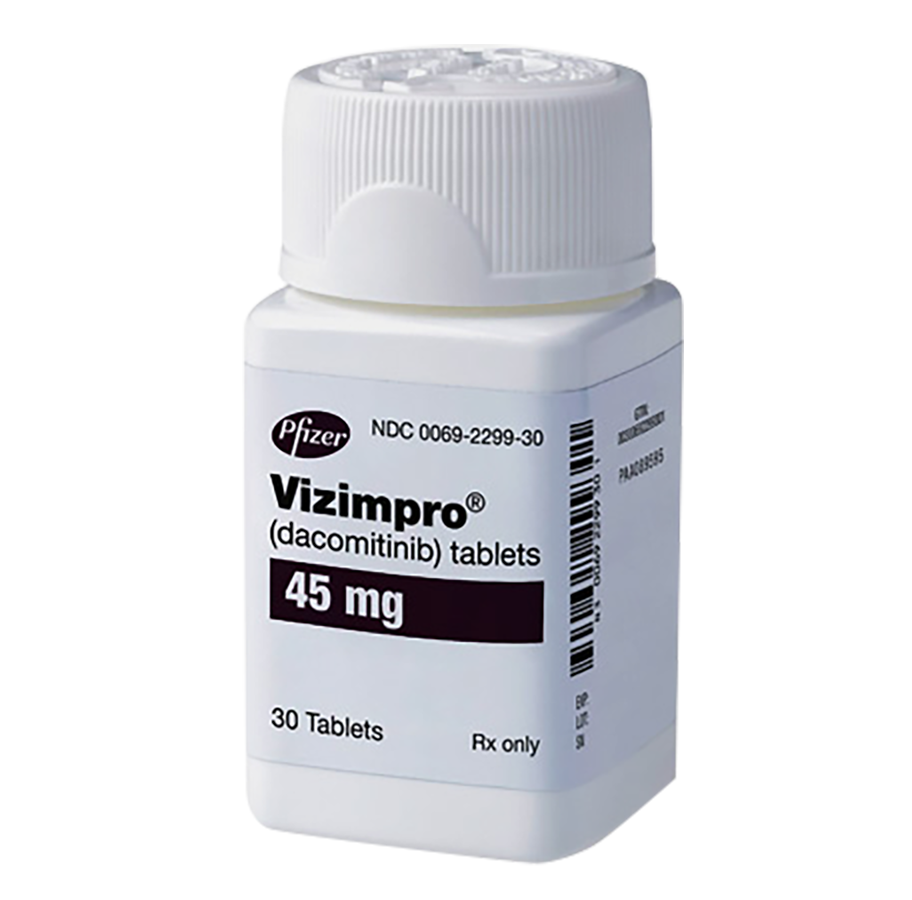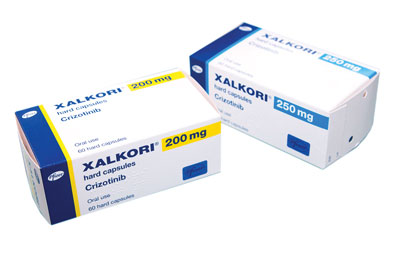Vizimpro (dacomitinib) vs Xalkori (crizotinib)
Vizimpro (dacomitinib) vs Xalkori (crizotinib)
Vizimpro (dacomitinib) and Xalkori (crizotinib) are both oral medications used to treat non-small cell lung cancer (NSCLC), but they target different genetic mutations. Vizimpro is a second-generation tyrosine kinase inhibitor (TKI) designed to inhibit the epidermal growth factor receptor (EGFR) with mutations that are common in NSCLC, and is typically used for first-line treatment. On the other hand, Xalkori is a first-generation TKI that targets ALK (anaplastic lymphoma kinase) and ROS1 (c-ros oncogene 1) rearrangements, which are less common but also present in some NSCLC patients; it is also used in first-line treatment for patients with these specific genetic profiles. When deciding between Vizimpro and Xalkori, it is crucial to have molecular testing to determine the presence of EGFR mutations or ALK/ROS1 rearrangements, as this will directly influence which medication is appropriate for an individual's cancer treatment.
Difference between Vizimpro and Xalkori
| Metric | Vizimpro (dacomitinib) | Xalkori (crizotinib) |
|---|---|---|
| Generic name | Dacomitinib | Crizotinib |
| Indications | First-line treatment of patients with metastatic non-small cell lung cancer (NSCLC) with epidermal growth factor receptor (EGFR) exon 19 deletion or exon 21 L858R substitution mutations | Treatment of metastatic NSCLC that is anaplastic lymphoma kinase (ALK) or ROS1-positive |
| Mechanism of action | Irreversible inhibitor of the EGFR family of tyrosine kinases | Inhibitor of ALK tyrosine kinase receptor and the c-Met/hepatocyte growth factor receptor |
| Brand names | Vizimpro | Xalkori |
| Administrative route | Oral | Oral |
| Side effects | Diarrhea, rash, paronychia, stomatitis, decreased appetite, dry skin, decreased weight, alopecia, cough, pruritus | Visual disorders, gastrointestinal effects, edema, elevated transaminases, fatigue, decreased appetite, upper respiratory infection, dizziness, neuropathy |
| Contraindications | None specifically listed; use caution in patients with severe renal impairment or moderate to severe hepatic impairment | Hepatic impairment or severe renal impairment |
| Drug class | Kinase inhibitor | Kinase inhibitor |
| Manufacturer | Pfizer | Pfizer |
Efficacy
Vizimpro (dacomitinib) Efficacy in Lung Cancer
Vizimpro (dacomitinib) is a kinase inhibitor specifically designed to target the epidermal growth factor receptor (EGFR), which is a common mutation found in non-small cell lung cancer (NSCLC). Clinical trials have demonstrated that Vizimpro is effective in treating patients with metastatic NSCLC harboring EGFR exon 19 deletion or exon 21 L858R substitution mutations. The pivotal trial for Vizimpro's approval, ARCHER 1050, showed a significant improvement in progression-free survival (PFS) when compared to another EGFR inhibitor, gefitinib. Patients treated with Vizimpro had a median PFS of 14.7 months versus 9.2 months for those on gefitinib.
Moreover, Vizimpro has shown an overall survival benefit in the treatment of NSCLC with EGFR mutations. In the ARCHER 1050 study, the median overall survival for patients taking Vizimpro was 34.1 months, compared to 26.8 months for those on gefitinib. These results indicate that Vizimpro can be an effective first-line treatment option for patients with EGFR-mutated NSCLC.
Xalkori (crizotinib) Efficacy in Lung Cancer
Xalkori (crizotinib) is an anaplastic lymphoma kinase (ALK) inhibitor used to treat NSCLC that is ALK-positive. The effectiveness of Xalkori in treating ALK-positive NSCLC has been established through several clinical trials. In a randomized trial comparing Xalkori to chemotherapy in previously untreated ALK-positive NSCLC patients, Xalkori significantly prolonged PFS, with a median PFS of 10.9 months compared to 7 months for chemotherapy.
Additionally, Xalkori has demonstrated efficacy in patients who have received prior treatment. In a single-arm study of patients with ALK-positive NSCLC who had progressed on chemotherapy, treatment with Xalkori resulted in a response rate of approximately 50-60%, with a median duration of response ranging from 7.7 to 11.1 months. These findings support the use of Xalkori as a standard treatment for patients with ALK-positive NSCLC, both as a first-line therapy and after chemotherapy failure.
Regulatory Agency Approvals
Vizimpro
-
European Medical Agency (EMA), European Union

-
Food and Drug Administration (FDA), USA

Xalkori
-
European Medical Agency (EMA), European Union

-
Food and Drug Administration (FDA), USA

-
Health Canada

-
Pharmaceuticals and Medical Devices Agency (PMDA), Japan

-
Therapeutic Goods Administration (TGA), Australia

Access Vizimpro or Xalkori today
If Vizimpro or Xalkori are not approved or available in your country (e.g. due to supply issues), you can access them via Everyone.org.
How it works

Make an enquiry
Choose the medicine you want to buy, answer a couple of questions, and upload your prescription to speed things up. We’ll get back to you within 24 hours.


Make an enquiry
Choose the medicine you want to buy, answer a couple of questions, and upload your prescription to speed things up. We’ll get back to you within 24 hours.


Breeze through the paperwork
We'll guide you through the required documents for importing unapproved medicine, ensuring you have all the necessary information.


Get a personalized quote
We’ll prepare a quote for you, including medicine costs and any shipping, administrative, or import fees that may apply.


Receive your medicine
Accept the quote and we’ll handle the rest - sourcing and safely delivering your medicine.

Some text on this page has been automatically generated. Speak to your physician before you start a new treatment or medication.
Let's talk
If you have any questions, call us or send us a message through WhatsApp or email:
Contact us




